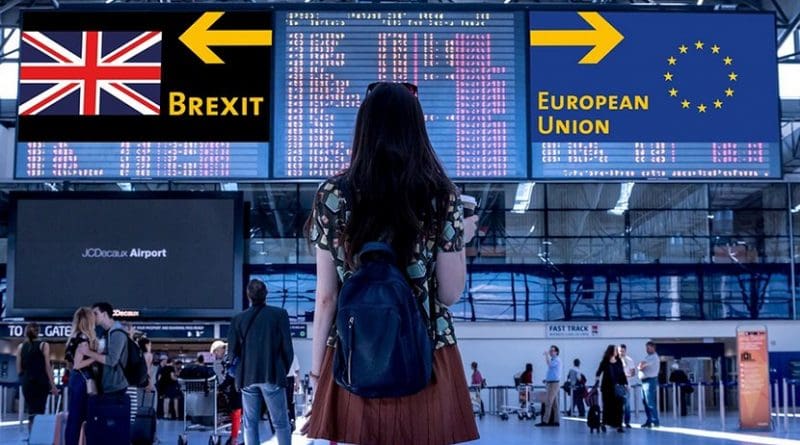Elections Unlikely To Solve EU’s Problems – OpEd
By Arab News
With about a month to go until the European Parliamentary elections, speculation is rampant about what will materialize. Will these elections be another run-of-the-mill polling process or something truly transformational?
Brexit, migration and the scourge of the far right have monopolized the debate. Yet traditional issues such as the economy may still affect the outcome of elections in which more than 400 million people can vote.
Yet perhaps these elections will not run to the pundits’ predicted path. A recent European Council for Foreign Relations and YouGov survey challenged a host of lazy myths. The elections are far from predictable at a time when establishment parties are under the cosh. Some 70 percent of voters have yet to make up their minds. Projections indicate about a third of MEPs will be anti-EU — a significant bloc. The two largest alliances, the European People’s Party and the Party of European Socialists, will lose ground, according to polls, and possibly even their combined majority.
Immigration will be a significant factor, but the YouGov poll showed it only ranks third amongst voters’ concerns. Remember that the surge in immigration was in 2015 and, in 2019, the numbers are way down. Only 15 percent of voters see migration as a threat to the EU, and only in Hungary is immigration seen as the No. 1 threat. In certain states, more people are worried about their nationals leaving and decreasing the population. This is understandable perhaps if you are from Romania, where in the last decade one in five people have left. Islamic extremism is, however, a massive concern — the top fear for most EU voters.
Yet nationalism is another anxiety. Many EU voters do feel European as well as being devoted to their national identity. Outside of Britain, most electorates are not keen on seeing the EU being torn apart, and are nervous at the impact of the extreme right.
The elections have specific country elements. They will be a test for Emmanuel Macron of France. It is his first electoral challenge since becoming president and comes in the wake of the “gilets jaunes” protests that have lasted since November. In Italy, the tensions between the governing coalition partners, Northern League and Five Star, may mean a fractious coalition, but even so the League should top the polls.
Far-right parties will no doubt continue to prosper Europe-wide. As it stands, nine governments in the EU include anti-EU parties. The Europe of Freedom and Direct Democracy and Europe of Nations and Freedom will be the likely beneficiaries. The True Finns party has just secured 17.5 percent of the vote in the recent national elections. Spanish voters go the polls on April 28, with the far-right Vox likely to win the first seat by a far-right party since the death of Francisco Franco in 1975. The Forum for Democracy may win more than 12 percent of the vote in the Netherlands.
Brexit looms massively over the vote. Barring a last-minute deal, British voters will elect 73 MEPs, with many arguing that the European elections will be a referendum on Brexit. The newly formed Brexit Party, with Nigel Farage at the helm, has surged into the lead in some polls, just ahead of Labour.
Yet this could be very misleading. Typically, European elections have attracted a very small turnout, just 35.6 percent last time; and, given the disillusionment with politics at the moment, it is hard to see why 2019 will buck the trend. More often than not, the European elections have been a protest vote. The debate is likely to be weary and tired rather than passionate and informed. Many voters will stick to their party allegiances rather than back opposing candidates from other parties just because of Brexit. In all likelihood, the results may be no more than mildly indicative rather than in any sense definitive.
Moreover, the pro-Remain parties have failed to coalesce on a shared platform that would have improved their impact and visibility. If you crave Brexit, you know who to vote for. For a Remain voter, it is not clear at all.
All this will reinforce the fears of EU leaders who do not want Britain to participate. The Parliament will be far more Euroskeptic with British members.
This election season has only highlighted what has been clear for a long time: Europe is divided north from south, west from east, on ideological lines and on identity. European voters want change. For a host of reasons, many feel that neither their national system nor the European system works for them.
The likelihood is that the logjam in Brussels will not be altered by the outcome of the elections. A tipping point has yet to be reached. None of the core challenges facing the EU will be resolved here, whether it be Brexit, the economy, climate change, immigration or extremism of any form. The EU, especially since enlargement, remains too cumbersome and unwieldy. The danger is that disenchantment with democratic and semi-democratic institutions failing to deliver and refusing to change course will only put these issues on ice for future years.
- Chris Doyle is director of the London-based Council for Arab-British Understanding (CAABU). Twitter: @Doylech

